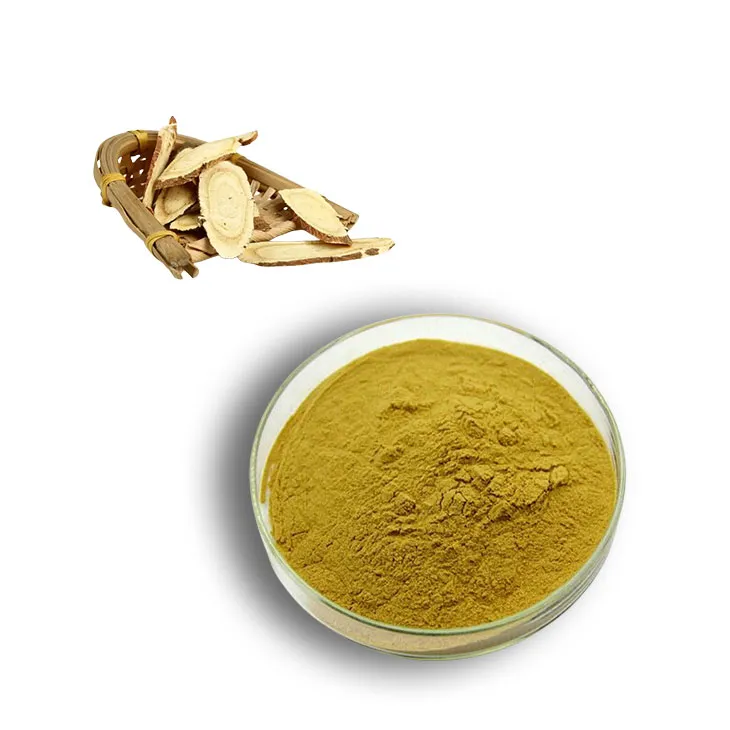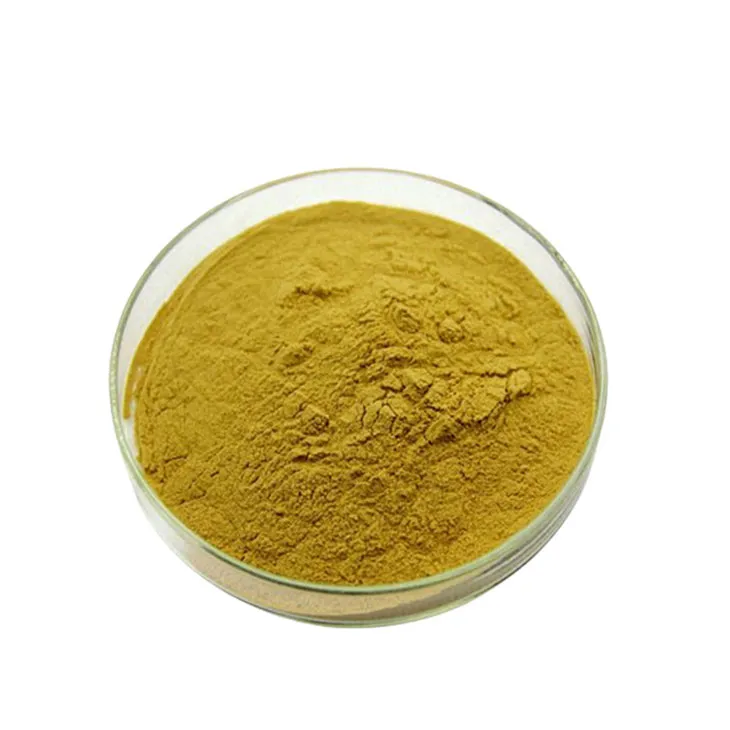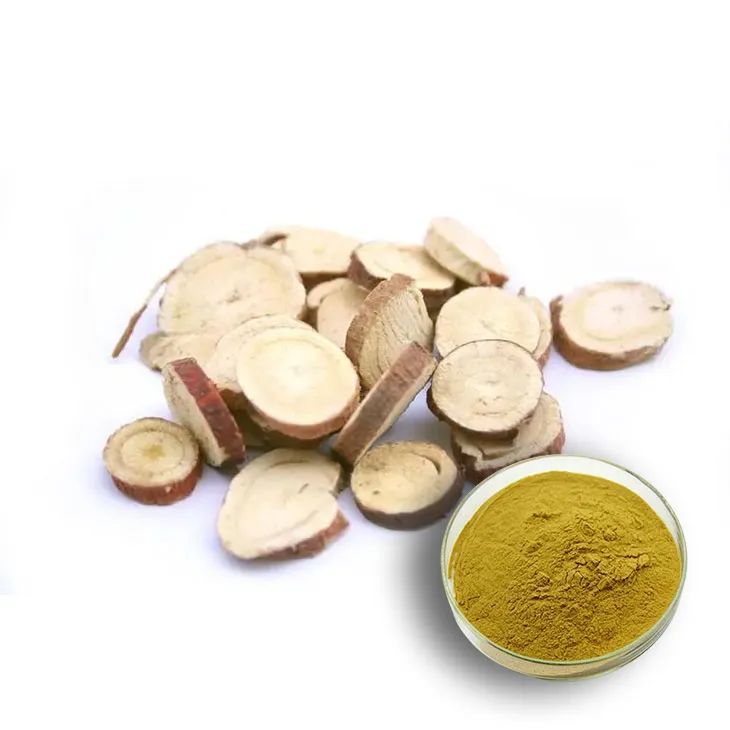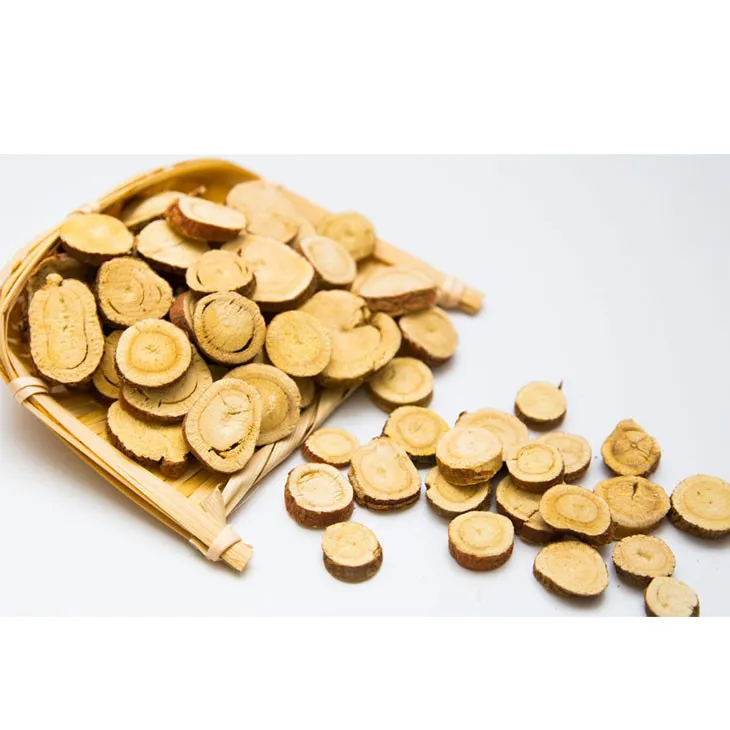- 0086-571-85302990
- sales@greenskybio.com
The Magic of Licorice Root Extract Powder: A Comprehensive Guide
2024-11-12

1. Introduction
Licorice Root Extract Powder has been a subject of great interest in various fields, from traditional medicine to modern cosmetics. This powder, derived from the licorice plant, holds a plethora of properties that have been explored and utilized for centuries. In this comprehensive guide, we will delve into the details of this remarkable substance, uncovering its unique characteristics, historical uses, and contemporary significance.

2. What is Licorice Root Extract Powder?
Licorice Root Extract Powder is a concentrated form of the active components found in the licorice root (Glycyrrhiza glabra). The licorice plant is native to parts of Europe and Asia and has been cultivated for its numerous benefits. The extraction process involves obtaining the key constituents from the root, which are then processed into a fine powder. These constituents include glycyrrhizin, flavonoids, and other bioactive compounds.

3. Unique Properties
3.1. Sweetness
One of the most notable properties of licorice root extract powder is its natural sweetness. It is significantly sweeter than sucrose, with glycyrrhizin being the main compound responsible for this intense sweetness. This makes it an interesting alternative to artificial sweeteners in some applications. For example, in the food industry, it can be used to add a natural sweet flavor without the high caloric content associated with traditional sugars.
3.2. Anti - Inflammatory Effects
The powder possesses strong anti - inflammatory properties. The flavonoids and other compounds in licorice root extract powder help to reduce inflammation in the body. This has been studied in relation to various health conditions, such as skin inflammations, respiratory tract inflammations, and digestive system inflammations. Studies have shown that it can inhibit the production of inflammatory mediators, thereby providing relief in inflammatory disorders.
3.3. Antioxidant Activity
Licorice root extract powder is rich in antioxidants. Antioxidants are substances that help to protect the body's cells from damage caused by free radicals. Free radicals are unstable molecules that can cause oxidative stress, which is linked to various diseases, including cancer, heart disease, and neurodegenerative disorders. The antioxidant activity of the powder helps to neutralize these free radicals, promoting overall health and well - being.

4. Historical Uses
4.1. In Traditional Chinese Medicine
In traditional Chinese medicine (TCM), licorice root has been used for thousands of years. It is considered one of the most important herbs in the TCM pharmacopeia. Licorice root was used to treat a wide range of ailments, including coughs, sore throats, and digestive problems. It was often combined with other herbs in formulations to enhance the overall therapeutic effect. For example, in formulas for treating respiratory conditions, licorice root was used to soothe the throat and reduce cough.
4.2. In Ayurvedic Medicine
Ayurvedic medicine, the traditional medicine system of India, also has a long history of using licorice root. It was used for its rejuvenating properties, as well as for treating skin diseases, urinary tract problems, and hormonal imbalances. Ayurvedic practitioners believed that licorice root could help to balance the body's three doshas (vata, pitta, and kapha).
4.3. In Ancient Egyptian Medicine
The ancient Egyptians were also aware of the medicinal properties of licorice root. They used it in the treatment of various diseases and as an ingredient in their embalming mixtures. Licorice root was likely valued for its sweet taste as well as its potential health benefits.

5. Modern - Day Significance in Medicine
5.1. Treatment of Gastrointestinal Disorders
In modern medicine, licorice root extract powder has shown promise in the treatment of gastrointestinal disorders. It can help to soothe the lining of the stomach and intestines, reducing irritation and promoting healing. For example, in cases of peptic ulcers, the anti - inflammatory and antioxidant properties of the powder can aid in the repair of the damaged mucosal lining. It can also be used to relieve symptoms of indigestion, such as bloating and abdominal pain.
5.2. Respiratory Health
For respiratory health, the powder can be beneficial in treating coughs, bronchitis, and other respiratory infections. It has expectorant properties, which means it helps to loosen and expel mucus from the lungs. This can provide relief for patients with congested airways. Additionally, its anti - inflammatory properties can reduce inflammation in the respiratory tract, improving breathing and overall respiratory function.
5.3. Anti - Viral and Anti - Bacterial Effects
There is evidence to suggest that licorice root extract powder has anti - viral and anti - bacterial effects. It has been studied for its potential to inhibit the growth of certain viruses and bacteria. For instance, some research has shown that it may be effective against the herpes simplex virus and Helicobacter pylori, a bacterium associated with peptic ulcers. However, more research is needed to fully understand and utilize these properties in the context of modern medicine.
6. Modern - Day Significance in Cosmetics
6.1. Skin Whitening and Brightening
In the field of cosmetics, licorice root extract powder has gained popularity for its skin whitening and brightening effects. The flavonoids in the powder can inhibit the production of melanin, the pigment responsible for skin color. This can help to reduce the appearance of dark spots, hyperpigmentation, and uneven skin tone, resulting in a more even and radiant complexion.
6.2. Anti - Aging Properties
The antioxidant activity of the powder makes it a valuable ingredient in anti - aging cosmetics. It helps to protect the skin from free radical damage, which can lead to premature aging, such as wrinkles, fine lines, and sagging skin. By neutralizing free radicals, licorice root extract powder can help to maintain the skin's elasticity and firmness, giving it a more youthful appearance.
6.3. Soothing and Anti - Inflammatory for Skin
As mentioned earlier, the powder has anti - inflammatory properties, which are beneficial for skin health. It can be used to soothe irritated skin, such as in cases of eczema, psoriasis, or sunburn. It can also help to reduce redness and inflammation associated with acne breakouts, making it a useful ingredient in acne - fighting skincare products.
7. Safety and Precautions
While licorice root extract powder has many potential benefits, it is important to be aware of some safety considerations. Excessive consumption of licorice root extract powder can lead to side effects, especially due to its glycyrrhizin content. High levels of glycyrrhizin can cause electrolyte imbalances, increased blood pressure, and fluid retention in some individuals. Pregnant women should also exercise caution when using products containing licorice root extract powder, as it may have potential effects on hormonal balance. Additionally, people with certain medical conditions, such as liver or kidney disease, should consult their healthcare provider before using products containing this powder.
8. Conclusion
Licorice root extract powder is truly a remarkable substance with a rich history and diverse range of applications. Its unique properties, including its natural sweetness, anti - inflammatory, antioxidant, and other bioactive effects, have made it valuable in both traditional and modern medicine, as well as in the cosmetics industry. However, as with any natural product, it is important to use it with caution and in accordance with proper guidelines. As research continues to uncover more about this powder, its potential for further applications and benefits may be even more fully realized in the future.
FAQ:
What are the main components of Licorice Root Extract Powder?
Licorice root extract powder contains glycyrrhizin, flavonoids, and other bioactive compounds. Glycyrrhizin is one of the most important components, which gives licorice its characteristic sweet taste and also has various biological activities.
What are the historical uses of Licorice Root Extract Powder?
Historically, it has been used in traditional medicine systems. For example, in Chinese medicine, it was used to soothe the throat, relieve coughs, and regulate the function of the spleen and stomach. In ancient Egyptian medicine, it was also used for various health - related purposes.
How does Licorice Root Extract Powder benefit the skin in cosmetics?
It has antioxidant properties that can help protect the skin from free radical damage. It also has anti - inflammatory effects, which can soothe irritated skin and potentially reduce redness. Additionally, it may help in moisturizing the skin, leaving it softer and more supple.
Are there any potential side effects of Licorice Root Extract Powder?
Excessive consumption may lead to some side effects. High levels of glycyrrhizin can cause issues such as high blood pressure, fluid retention, and potassium loss in some individuals. However, when used in appropriate amounts and formulations, these risks can be minimized.
How is Licorice Root Extract Powder used in modern medicine?
In modern medicine, it is being studied for its potential anti - viral, anti - bacterial, and anti - inflammatory properties. It may be used in the development of drugs for treating certain respiratory diseases, as well as for some gastrointestinal disorders.
Related literature
- The Therapeutic Potential of Licorice Root Extract in Modern Medicine"
- "Licorice Root Extract: Historical and Cosmetic Applications"
- "Bioactive Compounds in Licorice Root Extract Powder: A Review"
- ▶ Hesperidin
- ▶ Citrus Bioflavonoids
- ▶ Plant Extract
- ▶ lycopene
- ▶ Diosmin
- ▶ Grape seed extract
- ▶ Sea buckthorn Juice Powder
- ▶ Fruit Juice Powder
- ▶ Hops Extract
- ▶ Artichoke Extract
- ▶ Mushroom extract
- ▶ Astaxanthin
- ▶ Green Tea Extract
- ▶ Curcumin
- ▶ Horse Chestnut Extract
- ▶ Other Product
- ▶ Boswellia Serrata Extract
- ▶ Resveratrol
- ▶ Marigold Extract
- ▶ Grape Leaf Extract
- ▶ New Product
- ▶ Aminolevulinic acid
- ▶ Cranberry Extract
- ▶ Red Yeast Rice
- ▶ Red Wine Extract
-
Hawthorn powder
2024-11-12
-
Saw Palmetto Extract
2024-11-12
-
Almond Extract Powder
2024-11-12
-
Curcuma Longa Extract/Turmeric extract
2024-11-12
-
Fenugreek Extract Powder
2024-11-12
-
Konjac Powder
2024-11-12
-
Lycopene
2024-11-12
-
Andrographis Paniculata Extract Powder
2024-11-12
-
Beetroot juice Powder
2024-11-12
-
Feverfew Extract
2024-11-12





















